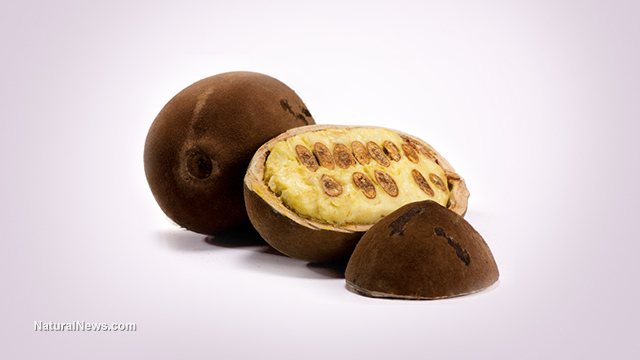Cupuacu fruit is a natural pharmacy and fountain of youth rolled into one
Monday, August 25, 2014 by: Carolanne Wright
Tags: cupuacu, cacao, natural pharmacy

- Newly released JFK files reveal Pentagon's role in creating Lyme disease and covid in the same lab
- Dr. Suzanne Humphries makes bombshell appearance on Joe Rogan podcast, exposing vaccine industry deception back to POLIOMYELITIS
- L.A.'s rebuilding nightmare: Only 4 permits issued after fire destroys 6,000 homes
- Discovery of vast underground city beneath Giza pyramids challenges human history
- Black cumin seed oil emerges as a powerful ally against breast cancer and chronic inflammation
- Catastrophic 7.7 earthquake devastates Myanmar and Thailand; death toll could reach 100,000
- AI breakthrough slashes celiac disease diagnosis time from months to minutes
- The hidden battle in your glass: How A1 and A2 milk could shape your health
- Sugar-free deception: Artificial sweeteners hijack hunger signals, fuel obesity epidemic, study warns
- Europe braces for WAR as EU urges citizens to STOCKPILE FOOD, in latest provocations with Russia
- Putin vows to 'finish off' Ukraine, accuses West of prolonging the war
- Thomas Massie’s Dual Loyalty Disclosure Act aims to restore American sovereignty by cracking down on foreign influence in Congress
- Aluminum pollution: A silent threat to human health
- Tesla owners under siege: Road rage, vandalism and political backlash fuel fear among drivers nationwide
- Chaos in Amsterdam: Five injured in broad daylight knife attack near Dam Square
- Kiss Your Genetic Privacy Good-Bye! 23andMe Gets Green Light to Sell Your Intimate Genetic Details to Anyone They Want
- "Feel G.O.O.D. Gut Health Program" on BrightU: Dr. Basima Williams introduces the Feel-Good Plate Method
- Trump's 25% auto tariffs: A bold move to strengthen U.S. manufacturing despite short-term challenges
- Newly released JFK files reveal Pentagon's role in creating Lyme disease and covid in the same lab
- Analysis: The coming economic collapse, a mass uprising and Trump's three secret weapons to halt the growing revolt
- Trump nominates VACCINE ZEALOT Susan Monarez to lead the CDC, sidelining RFK Jr.'s reform efforts
- Trump's greatest betrayal so far: Accelerating Middle East wars, silencing dissent, and serving Zionist masters
- Dr. Mike Yeadon releases 15-minute testimony - WATCH - about genocidal intent of COVID “vaccines”
- Festive flavors: The sweet history, nutritional profile and health benefits of pecan pie
- Elon Musk: Aliens could be here on Earth RIGHT NOW
- Big Pharma's $8 Billion bribery scheme exposed: how doctors are pushed to prescribe junk science, not heal
- 5 Simple steps to boost your brainpower: How to strengthen executive function in a distracted world
- Trump reverses course on Gaza plan, says “nobody is expelling Palestinians”
- A lack of integrity in Academia: Harvard professor found GUILTY of fraudulent research to promote CRT theory
- Reclaim your health: How midlife exercise reverses years of inactivity
- Survival 101: Effective EMF blocking techniques
- Florida takes a stand: DeSantis proposes permanent ban on mRNA vaccine mandates
- Sugarcane extract superior to cholesterol-lowering drugs?
- California's social media censorship law struck down: A victory for free speech or a threat to online safety?
- OpenAI whistleblower who dissented against how the company trained ChatGPT found dead
- EPA advisor admits the agency is funneling billions to climate groups ahead of Trump’s return to White House
- EPA advisor admits the agency is funneling billions to climate groups ahead of Trump’s return to White House
- Newly released JFK files reveal Pentagon's role in creating Lyme disease and covid in the same lab
- California's social media censorship law struck down: A victory for free speech or a threat to online safety?
- Dr. Mike Yeadon releases 15-minute testimony - WATCH - about genocidal intent of COVID “vaccines”
- The Health Ranger releases “Vaccine Zombie” song and music video, using AI-animated zombies for the music video
- The pandemic as a tool for INDOCTRINATION: Understanding “The Indoctrinated Brain” by Dr. Michael Nehls
- Florida takes a stand: DeSantis proposes permanent ban on mRNA vaccine mandates
- “Why we influenced the 2020 elections”: Facebook files reveal the coordinated effort to bury the Hunter Biden laptop story
- Mike Adams releases country western hit single: Goin’ Back in Time is Comin’ Home
- Mike Adams releases music poetry sensation: A Child of God
- Unpacking the Lies That We’ve Been Fed – new song and music video released by Mike Adams, the Health Ranger
- Michigan sheriff announces criminal investigation into 2020 election crimes, Dominion Voting Systems
- Migrants are taking advantage of recent hurricanes to scam residents and loot their homes
- House Intelligence Committee calls for the ARREST and PROSECUTION of Dr. Anthony Fauci
- RFK Jr. clears key hurdle: Sen. Susan Collins backs controversial HHS nominee, signaling a new era for health policy
- Rep. Nancy Mace introduces bill to ban biological males from female facilities on federal property
- Peter Rost exposes Big Pharma corruption in his book “The Whistleblower: Confessions of a Healthcare Hitman”
- Mike Adams releases new song and music video: Nothing More Disgusting Than a Globalist
- Red Cross issues warning to stop blood plasma donations from vaccinated people
- Scientists confirm: GENIUS brain function can be spontaneously unleashed in humans without any apparent cause
- EPA advisor admits the agency is funneling billions to climate groups ahead of Trump’s return to White House
- HYSSOP: What research reveals about the health benefits of this ancient holy herb
- Two containers with completed ballots fall out of truck in Florida
- Fully vaccinated about to see “tsunami” of illness and death, warns virologist
- Global leaders unite to clamp down on “misinformation” with UN-backed Cascais Declaration
- BREAKING: 2025 NDAA authorizes mandatory military draft of WOMEN across America… as Pentagon pursues global NUCLEAR war with both Russia and China at the same time
- Michael Yon warns of a ZIONIST TAKEOVER in Trump’s second administration
- BOMBSHELL: DNA testing kits are a SCAM to develop ethnic-specific bioweapons
- Ozempic and Wegovy weight loss drugs are injectable LIZARD VENOM PEPTIDES that may unleash a devastating wave of organ failure… side effects align with symptoms of SNAKE BITES
- Israeli soldiers accused of even more torture and abuse in the West Bank
- These 13 countries just signed an agreement to engineer a global FAMINE by destroying food supply
- NASA admits that climate change occurs because of changes in Earth’s solar orbit, and NOT because of SUVs and fossil fuels
- RFK Jr. clears key hurdle: Sen. Susan Collins backs controversial HHS nominee, signaling a new era for health policy
- Sermon 30: How Jesus reveals Caesar’s FAKE CURRENCY and FALSE AUTHORITY
- Coriander seeds: Ancient medicine backed by modern science
- Arizona officials claim Maricopa County needs 10-13 days to tabulate results of the election
What other fruit can lower cholesterol and blood pressure, spark natural weight loss and ease pain and inflammation while improving emotional outlook and memory? Add to this the benefits of radiant hair and skin, a strong immune system, fortification against cancer and a reduction of digestive distress, and it's no wonder that cupuacu is referred to as nature's ultimate pharmacy and fountain of youth.
A time-honored superfruit with remarkable healing properties
Brimming with antioxidants, flavonoids and phytonutrients, cupuacu has been used for centuries in the Amazon to promote energy, encourage cardiovascular health and soothe abdominal discomfort. Especially abundant in vitamin C, the fruit supports weight loss by triggering the production of fat-burning carnitine while reducing the the stress hormone cortisol -- a compound that is infamous for its ability to pack on the pounds. Not only does cupuacu dissolve fat stores, but it also helps the body burn more calories by increasing energy levels. Although it doesn't actually contain caffeine, ingesting the fruit generates a caffeine-like effect, but without the jittery drawbacks or blood sugar crashes.Cupuacu contains powerful antioxidants called theograndins. These compounds have "shown great promise in destroying colon cancer cells and counteracting the damage of free radicals, which are a main contributor to premature aging," according to Danica Collins in the article "Amazonian Super Fruit Cupuacu Helps You Lose Weight Naturally." Also rich in B vitamins, niacin, amino acids and healthy fats, cupuacu fosters lustrous hair and youthful skin. Cupuacu's impressive essential fatty acid profile also helps support memory and stable moods.
Cupuacu is often used in smoothies, desserts, ice creams and jams. Amy Vergin of Alternative Medicine noted, "While it may smell of chocolate and pineapple, people say it tastes like a pear with a hint of banana. Some have even gone as far as to say that it resembles the taste of bubblegum." The fruit is also beginning to emerge as a popular natural cosmetic addition, found in everything from facial treatments to body lotions. The pulp of the fruit is exceptionally hydrating, with similar characteristics as cocoa butter.
Although the fresh fruit is difficult to source outside South America, several innovative U.S. manufacturers are harnessing the power of cupuacu in the form of supplements, nutritional powders and body care products.
Sources for this article include:
http://undergroundhealthreporter.com
http://www.naturalhealth365.com
http://www.alternativemedicine.com
About the author:
Carolanne believes if we want to see change in the world, we need to be the change. As a nutritionist, wellness coach and natural foods chef, she has encouraged others to embrace a healthy lifestyle of green living for over 13 years. Through her website www.Thrive-Living.net she looks forward to connecting with other like-minded people who share a similar vision.
Follow on Facebook: www.facebook.com/pages/Thrive-Living/4995788...
For Pinterest fans: www.pinterest.com/thriveliving/
Find at Google+: www.goo.gl/cEZiyR
Diaspora*: carolanne@pod.orkz.net
Tsu: www.tsu.co/ThriveLiving
and Twitter: www.twitter.com/Thrive_Living
Read her other articles on Natural News here:
www.naturalnews.com/Author1183.html
Cupuacu at FETCH.news
Get independent news alerts on natural cures, food lab tests, cannabis medicine, science, robotics, drones, privacy and more.
Take Action: Support Natural News by linking to this article from your website
Permalink to this article:
Embed article link: (copy HTML code below):
Reprinting this article:
Non-commercial use OK, cite NaturalNews.com with clickable link.
Follow Natural News on Facebook, Twitter, Google Plus, and Pinterest
Science News & Studies
Medicine News and Information
Food News & Studies
Health News & Studies
Herbs News & Information
Pollution News & Studies
Cancer News & Studies
Climate News & Studies
Survival News & Information
Gear News & Information
News covering technology, stocks, hackers, and more



"Big Tech and mainstream media are constantly trying to silence the independent voices that dare to bring you the truth about toxic food ingredients, dangerous medications and the failed, fraudulent science of the profit-driven medical establishment.
Email is one of the best ways to make sure you stay informed, without the censorship of the tech giants (Google, Apple, Facebook, Twitter, YouTube, etc.). Stay informed and you'll even likely learn information that may help save your own life."
–The Health Ranger, Mike Adams












































